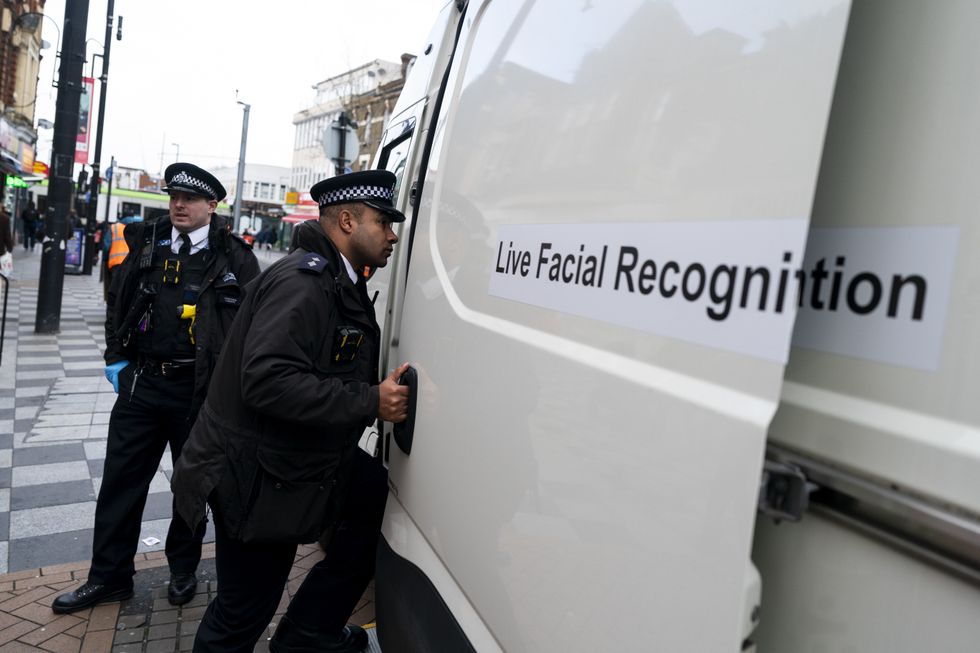



The Metropolitan Police is set to double its use of live facial recognition in a bid to tackle London's crime crisis.
The Met's use of live facial recognition will increase to 10 deployments per week as the force attempts to patch a void left by the loss of 1,400 officers and 300 staff members.
The restructuring will also see a number of officers transferred to the force's public order crime team.
The Met has said this is due to an increase in protest-related crimes in the past two years, particularly related to the pro-Palestine and environmental causes.

PA
|PICTURED: Metropolitan Police Commissioner Sir Mark Rowley grins during a walkabout in the West End
Commissioner Sir Mark Rowley said: "The numbers of protests have grown over the last couple of years.
"What we've seen, unfortunately, is a proportion of those create crime and offences," he added.
The Met announced earlier this month that its use of live facial recognition technology led to 1,000 arrests being made across the capital, with 773 of these leading to charges or cautions.
"It's a fantastic piece of technology. It's very responsibly used, and that's why most of the public support it," he added - though campaigners furiously disagreed.
A 2024 study by the Centre for Emerging Technology and Security at The Alan Turing Institute found that 85 per cent of Britons were comfortable with police using the technology to verify identities at the UK border.
This fell to around 60 per cent when respondents were asked about police using it to identify criminal suspects in a crowd.
And just 29 per cent were comfortable with biometric data being used by the police to determine whether someone might be telling the truth.
 PA |
PA |
The Met has blamed a surge in protests for the mega facial recognition rollout
Charlie Whelton, policy and campaigns officer at the Liberty human rights group said: "It's incredibly concerning to see an expansion of facial recognition, especially at a time when there is a complete lack of regulation governing its use.
“The Government must legislate now to regulate this technology, protect people’s rights, and make sure that the law on facial recognition does not get outpaced by the use."
In London, officers will be moved to neighbourhood teams to tackle petty street crime, including phone thefts and shoplifting, with 80 officers moved to the team covering the West End.
Retailers warned earlier this month that iconic high streets, such as Oxford Street, will be at risk unless urgent national action is taken on crime.
Rowley dismissed concerns surrounding the Met's live facial recognition technology, affirming that it is only be used to "look for serious offenders like wanted offenders and registered sex offenders".
“We routinely put it out there and capture multiple serious offenders in one go, many of whom have committed serious offences against women or children, or people who are wanted for armed robbery," he continued.
High Street UK, a group representing over 5,000 businesses, has demanded more action to deal with high street crimes after shoplifting offences hit a record high of 500,000 last year.
Rowley said that the officers being moved into the West End neighbourhood teams will be tasked with cracking down on pickpockets and tackling gangs planning to carry out shop robberies.
An additional 90 officers will be moved to six robbery hotspots across the capital, including Brixton, Kingston, Ealing, Finsbury Park, Southwark and Spitalfields.
 PA |
PA |
Sadiq Khan and Sir Mark Rowley, pictured testing new police technology
London Mayor Sadiq Khan said: "This is the latest example of the Met Police and I prioritising what Londoners want and delivering on our pledge to put high visibility policing at the heart of fighting crime and rebuilding community confidence and trust."
However, Shadow Home Secretary Chris Philp MP told GB News earlier this year that Khan was the "worst police and crime commissioner of any of the 43 police forces across England and Wales".
He said: "He's presided over the most ineffective police force in the country for catching criminals, despite the fact that the Met has the highest funding per capita of any police force in the country."
The Met is the UK's largest police force, with over 33,000 officers, 11,000 staff and 1,400 community support officers.
But Rowley has warned that the organisation is facing a budget shortfall of £260million, with cuts causing the force to shut down units such as the Royal Parks police and schools officers.
